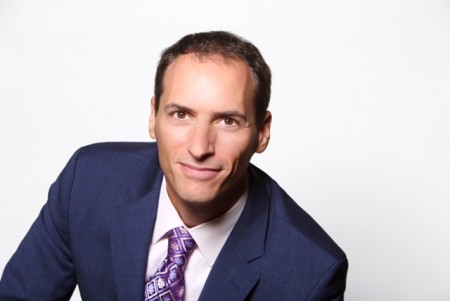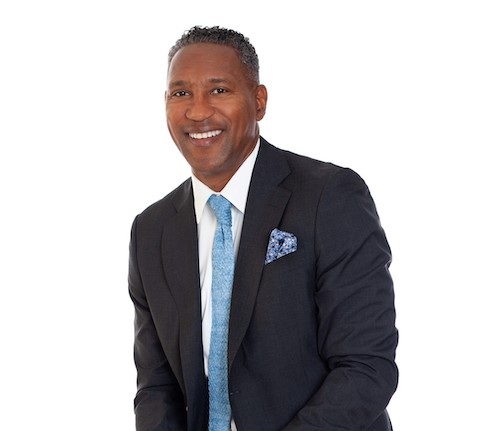New CEO of IP law firm talks dynamic leadership with client-centric insight

Ari Kaplan. Photo by Lauren Hillary.
Ari Kaplan recently spoke with Raymond Millien, the new CEO of Harness, Dickey & Pierce, an intellectual property boutique firm with four offices and headquarters in suburban Detroit.
Ari Kaplan: Tell us about your background and your new role at Harness Dickey.
Ray Millien: I grew up in Brooklyn, New York, and my parents are from Haiti. I went to Columbia for engineering, majored in computer science, and started my career programming for General Electric in their aerospace division. After coding for 10 hours a day on a government project, I decided to listen to the nuns—I went to 12 years of Catholic school—who always told me that since I liked to argue, that I should become a lawyer. I went to GW Law School, and the rest is history. After working in private practice and in-house, I now find myself in suburban Detroit as the CEO of a 100-year-old IP boutique.
Ari Kaplan: You served as the chief IP officer for Volvo Car Group and the CEO of Volvo Car Ventures before joining Harness Dickey. How do you see that experience on the client side shaping your leadership of the firm?
Ray Millien: There are many lawyers who have risen through their firms to become leaders, but while years of practice give you expertise in a given area of the law, lacking the client’s perspective can occasionally result in providing legal advice in a vacuum. The advantage of having served in various roles in-house is that I’ve been on the business side of offering clients advice, and when you are in-house, you live with the legal advice that you provide. Your bottom line is affected by their bottom line because you are part of the same organization. Having that experience and appreciating the business nature of legal guidance makes you a better lawyer.
Ari Kaplan: What can law firms do to better understand and connect with their clients in a remote environment?
 Ray Millien, the new CEO of Harness, Dickey & Pierce.
Ray Millien, the new CEO of Harness, Dickey & Pierce.
Ray Millien: These are challenging times, and to say that one firm, one industry or one person has it figured out is disingenuous. We are all trying to figure out how to use technology, whether it’s videoconferencing or putting information into the cloud, and how it can keep us connected in this new remote environment. That said, there is no doubt that there’s a certain mentorship from watercooler conversations and informal meetings in random conversations that help people learn something they did not know previously. The social aspect of practicing law is missing and tough to replicate in a remote environment. We use as much technology as possible to make an extra effort to connect.
Ari Kaplan: How have client expectations changed over the past few years?
Ray Millien: Clients, especially our larger corporate clients, are asking for more accountability, particularly with reference to cost, rather than the quality of our legal advice. Also, they want their outside counsel and all of their vendors to be socially responsible. Expectations for outside counsel and vendors in general have greatly increased in the past few years.
Ari Kaplan: In what ways can outside counsel provide more value to their in-house colleagues?
Ray Millien: Outside counsel can provide more value since they traditionally operate in firefighter mode. If a client has a problem, they call outside counsel in order to solve the problem and put out the fire. Once the fire is out, however, outside counsel turns the truck around and heads back to the fire station. Today, in order to add more value, lawyers need to go from being firefighters to being fire wardens. Outside counsel has to work with clients on how to prevent those fires and figure out what infrastructure, information and data analysis can be put into place to avoid them. That’s how lawyers can provide more value—not just by providing discrete legal services to put out fires but by guiding in-house colleagues to prevent the fires from happening beforehand and helping those clients grow financially.
Ari Kaplan: Are there elements of leadership required to drive change in law firms today that were not necessary when you were practicing at a law firm?
Ray Millien: Definitely. Technology and mental health. First, as a result of our remote environment, personnel expect more value from leadership, which not only involves leading people but also making sure that they have the necessary tools, resources, data and information to make their jobs easier. Second, because we’re in a remote environment, leaders have to be more aware of the mental health of their employees. At the end of day, you don’t lead an organization, you lead people, and it is critical to make them feel that they’re doing a job that’s needed, which makes them feel wanted and appreciated. Leaders must create a good mental space for them to work.
Ari Kaplan: How can law firms with a specific focus maintain their competitive advantage in a shifting legal landscape?
Ray Millien: There’s been a lot of consolidation in the industry where traditional general practice firms are acquiring IP boutiques, but reports of the demise of the IP boutique have been exaggerated and premature. There is a certain class of clients that know exactly the type of IP services that they require and realize they can get that specialization from a boutique.
Ari Kaplan: Where do you see the legal industry headed?
Ray Millien: The profession has become a lot more self-aware, especially during the pandemic, but the legal industry has to continue to evolve to focus on the people providing the services, since it is known for burning them out. I think the industry has long focused on profits and must concentrate on what generates those profits. It has to become more people-centric and enhance job satisfaction and work-life balance.
Listen to the complete interview at Reinventing Professionals.
Ari Kaplan regularly interviews leaders in the legal industry and in the broader professional services community to share perspective, highlight transformative change and introduce new technology at his blog and on iTunes.



